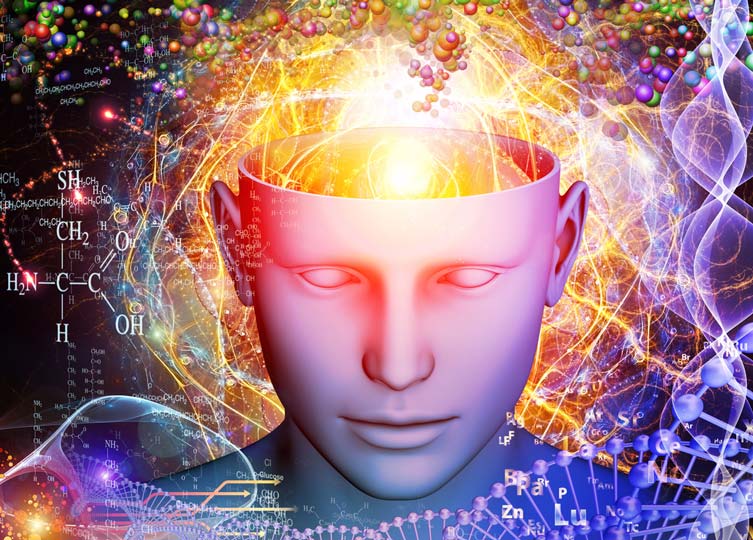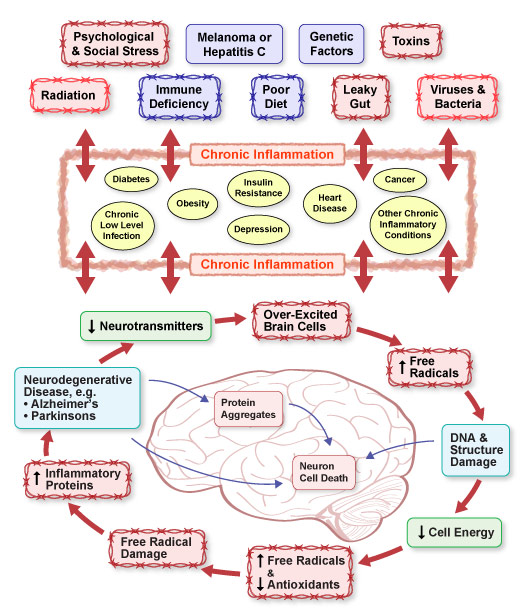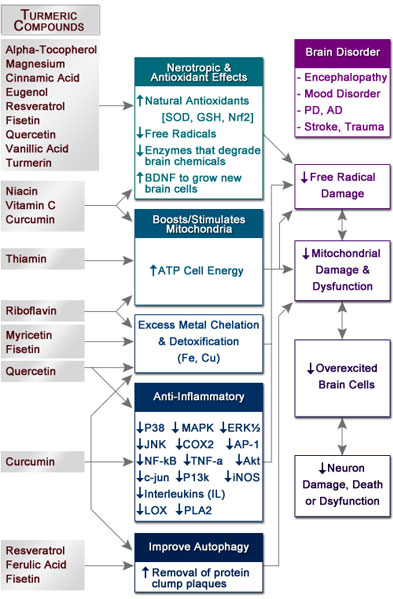Turmeric Compounds Benefit Brain and Neurological Health

Can turmeric help prevent or treat the symptoms of dementia, mood disorders, and damaged nerves? As in other areas of the body, a healthy brain and nervous system are closely regulated and biochemically balanced. In basic terms, neurological disorders and brain damage can occur when the brain cells are overexcited and can't seem to recover homeostasis, or balance. (iv.1-26)
Turmeric's anti-inflammatory, antioxidant, and beneficial immune system activity can help maintain or bring that healthy balance back. Research suggests turmeric's effects could help prevent and even treat a number of neurological conditions, including: (iv.1-26)
| BRAIN AND MOOD DISORDERS | |
|---|---|
| Alzheimer's Disease | Multiple sclerosis |
| Anxiety | Neuropathic pain |
| Bipolar disorder | Neurosis |
| Chronic Stress | Obsessive-compulsive behavior (OCD) |
| Creutzfeldt-Jacob (mad cow) disease | Parkinson's disease |
| Depression | Schizophrenia |
| Encephalomyelitis | Spinal injury |
| Encephalopathy (diabetic and hepatic) | Stroke |
| Epilepsy | Wernicke-Korsakoff syndrome |
Too Much Excitement in the Brain Can Cause Damage

Chronic Inflammation in the Brain
Similar to elsewhere in the body, toxins, microbes, and physical trauma normally initiate an immune system response. The brain also has its own unique immune system, primarily involving cells called microglia and astrocytes. When activated, these brain cells stimulate production of inflammatory proteins (e.g., cytokines and interferons). (iv.1, 5, 27-29)
If left unchecked, chronic activation of these immune cells makes them overexcited and is harmful to brain neurons. Damaged brain cells can lead to neurodegenerative diseases (e.g., Alzheimer's ) and psychological disorders (e.g., anxiety and depression). (iv.1, 5, 27-29)
How Are Overexcited Brain Cells Dangerous to Brain Health?
Too many overexcited brain cells cause chemical imbalances in the spaces between brain neuron cells. This creates a toxic environment of chronic inflammation and free radicals that: (iv.1, 5, 27, 28, 30-33)
- Triggers the "master switch" for inflammation-the NF-κB family of transcription factors.
- Continues to activate more brain immune system cells (astrocytes and microglia) that overproduce cytokines and Inflammatory enzymes.
- Breaks down amino acids needed to make essential brain chemicals, and produces harmful metabolites.
- Damages the cell's power generating organelles (the mitochondria).
- Decreases cell energy and natural antioxidant levels.
- Generates even more free radicals.
The chronic inflammatory cycle leads to protein clumps, neuron-brain cell damage, and/or neuron cell death. In turn, neurotransmitter brain chemical levels produced by these cells (such as dopamine and serotonin) drop. Symptoms of brain injury, neurodegenerative disease (such as Alzheimer's disease), and/or mood disorders (such as depression) appear, which can include: (iv.3, 4, 6, 10, 11)
- Impaired motor skills (e.g., movement)
- Memory loss
- Cognitive dysfunction
Worse, the inflammatory, low-energy environment created by damaged and dysfunctional mitochondria makes immune system cells in the brain hypersensitive to chemical imbalances. This means that even normal brain chemical levels can activate otherwise inactive brain cells — creating more overexcited cells and toxic inflammation. (iv.3, 4, 6, 10, 11)
Beneficial Compounds in Turmeric that Promote a Healthy Brain

Effects of Turmeric Compounds in the Brain
Turmeric contains numerous polyphenol compounds. They are potent antioxidants and some are also anti-inflammatory substances (especially curcumin). Important to the central nervous system, curcuminoids in turmeric are small enough to cross the blood-brain barrier. (iv.4, 5, 27, 30, 34-47)
Expert neurologists suggest that substances like those found in turmeric can help treat and heal the central nervous system and restore brain health. Studies show that turmeric's curcumin compound's beneficial activity in the brain includes: (iv.3-6, 10, 11, 27, 30, 34-47)
- Antioxidant protection from free radicals.
- Suppressing activation and overexcitement of brain immune system cells.
- Reducing inflammation.
- Protecting cell mitochondria.
- Stimulating neurotrophic growth factors such as BDNF. These help rebuild neuron brain cells and promote brain cell growth.
- Helping regulate brain chemicals that affect mood (e.g., serotonin and dopamine).
- Promoting the heat shock response — a natural defense system in the brain.
- Preventing or getting rid of protein plaques (involved in conditions such as Alzheimer's disease and Parkinson's diseases).
All of these effects may help prevent or relieve symptoms of a number of neurological conditions. (iv.4, 27, 30, 34-45)
Besides curcumin, turmeric has other helpful micronutrients and phytochemical compounds. Some of the nutrients in turmeric are essential for brain health, including keeping memory function and neuron brain cells in good working order. Many of these compounds can also help stop harmful processes in the brain. (iv.4, 27, 30, 34-45)
Join the 1000s of People Who Are Discovering the Benefits of Turmeric.

Healthceuticals® Turmeric Curcumin Complex
100% Certified
Organic ingredients
- Organic Turmeric Extract - standardized to 95% curcuminoids.
- Organic Whole Turmeric - provides full spectrum antioxidant, anti-inflammatory turmeric benefits, including turmerones and numerous vitamins, minerals, and phytonutrients
- Organic Black Pepper Extract - standardized to 95% piperine; dramatically enhances bioavailablity.
- Organic Phospholipids - markedly improve absorption.
- Organic Ginger - works synergistically with turmeric to provide more powerful benefits.
- Absolutely FREE of potentially harmful additives and fillers such as magnesium stearate.


